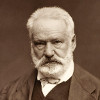“ Poverty in youth, when it succeeds, has this magnificent property about it, that it turns the whole will towards effort, and the whole soul towards aspiration. ”
Victor Hugo, Les Misérables (1862). copy citation
| Author | Victor Hugo |
|---|---|
| Source | Les Misérables |
| Topic | youth poverty |
| Date | 1862 |
| Language | English |
| Reference | |
| Note | Translation by Isabel F. Hapgood in 1887 |
| Weblink | http://www.gutenberg.org/files/135/135-h/135-h.htm |
Context
“Words which Marius continued to wear, not on his breast, since the colonel’s writing had disappeared, but in his heart.
And then, on the day when his grandfather had turned him out of doors, he had been only a child, now he was a man. He felt it. Misery, we repeat, had been good for him. Poverty in youth, when it succeeds, has this magnificent property about it, that it turns the whole will towards effort, and the whole soul towards aspiration. Poverty instantly lays material life bare and renders it hideous; hence inexpressible bounds towards the ideal life. The wealthy young man has a hundred coarse and brilliant distractions, horse races, hunting, dogs, tobacco, gaming, good repasts, and all the rest of it;”
source


